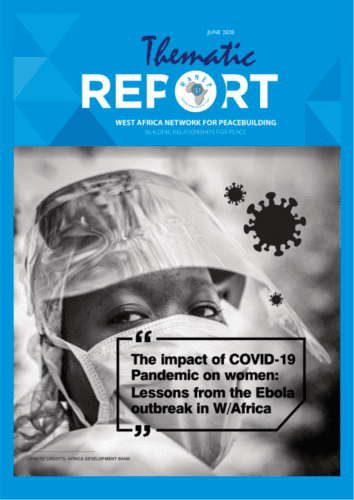Attachments
Introduction
Since the emergence of the COVID-19 pandemic in December 2019, the effects on human lives have been devastating. The virus has spread across all 15-member states of the Economic Community of West African State (ECOWAS) recording more than 76,355 confirmed cases and 1,323 fatalities as of June 30, 2020 . The pandemic has impacted countries in the region differently, but its current and long-term impact indicates an adverse effect on the economic and social vulnerabilities of West Africa. Like most complex emergencies and crises, the gender dimensions of the pandemic pose a threat to pre-existing gender and other intersecting inequalities especially on women and girls. This includes health, economic, security and social protection challenges.
Before the outbreak of the pandemic, public health infrastructure in the region had been weak and largely disadvantaged to women and girls in terms of access to maternal and reproductive healthcare. For instance, the Burkinabe Government forced the closure of 71 health centres, while services in 75 others were impaired, significantly affecting over 881,000 people, especially women and children with limited access to healthcare in the COVID-19 pandemic . In the northeastern States of Nigeria, the healthcare and social service systems in Yobe, Adamawa and Borno States were fractured with 35 per cent of health facilities damaged by violent extremism and conflicts and with disruptive impact on routine vaccination campaigns and other essential health services . Reports also indicate that women on the frontlines of responses to mitigate the spread of COVID-19 are also exposed to the risks of infection and fatality from the virus through their work as health and social care providers. According to analysis from the International Council of Nurses (ICN) based on data from National Nursing Associations, official figures and media reports from a limited number of countries, more than 230,000 healthcare workers have contracted the disease, and more than 600 nurses, mostly women, have died from the virus as at June 2020 . In comparison to the Ebola outbreak in West Africa, out of a total of 11,325 deaths, between 59 and 75 per cent were women including female healthcare workers .
The economic challenges during and after the pandemic pose significant threats to the income and livelihoods of women engaged in micro-level businesses such as farming, street hawking, retail trading, and other domestic services . The implication to food security has raised regional concerns especially as 70% of the subsistence agriculture is dominated by women. As in the case of the Ebola crisis in the region, COVID-19 prevention measures are having a drastic impact on women’s livelihoods and economic security.
In times of complex humanitarian emergencies in West Africa, women and children often face a higher risk of sexual exploitation, child labour and gender-based violence. Current statistics indicate that one in three women experience violence in their lives and this is exacerbated in crisis situations. Lessons learned from the Ebola crisis in West Africa of 2014-2016, indicate a trend where women and girls faced sexual and gender-based violence, unintended pregnancies and social stigma which in some cases, led to eviction from their homes, loss of employment and other socio-cultural abuses. A similar pattern is emerging in the current pandemic as reports of sexual and gender-based violence has spiked across most of the countries in the region.
This thematic report highlights the health, economic and social security of women and girls in the ongoing pandemic while drawing lessons from the experience of the Ebola crisis to mitigate the gender impact as well as make recommendations for effective action.
Source link : https://reliefweb.int/report/sierra-leone/impact-covid-19-pandemic-women-lessons-ebola-outbreak-wafrica
Author :
Publish date : 2020-09-23 07:00:00
Copyright for syndicated content belongs to the linked Source.
